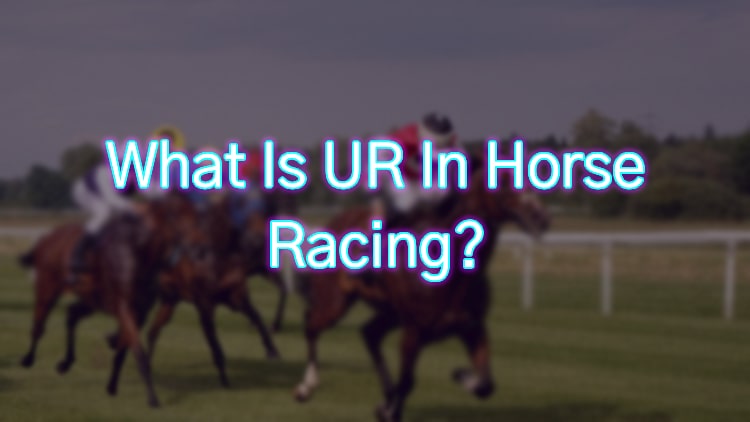
If you've ever watched a horse race or read race results, you might have come across the term "UR". This abbreviation can be a bit confusing, especially if you're new to horse racing.
UR stands for "Unseated Rider". This means that during the race, the jockey fell off the horse. Various reasons can lead to a jockey being unseated, such as the horse stumbling or an unexpected bump from another horse.
Unseating can occur at any time during the race and usually means the horse will not complete the race. It's one of the many unpredictable elements that make horse racing exciting but also risky.
Understanding these terms is important for anyone interested in horse racing, whether you're a casual viewer or looking to place a bet.
UR Meaning In Horse Racing
In horse racing, UR is an important term to understand. It stands for "Unseated Rider", which happens when a jockey is accidentally dislodged from their horse during a race.
When a rider is unseated, they do not remain on the horse, and as a result, the horse is usually unable to finish the race. Even if the horse goes on to complete the course, they do not factor into the final results; they are essentially disqualified. This can dramatically change the outcome, which is why it's a crucial term for bettors and fans to know.
The incident can be caused by several factors. The horse might trip, lose balance, or there could be contact with another horse. Such events illustrate the unpredictable nature of horse racing.
While it is unfortunate for the jockey and the horse, safety protocols are in place to handle such situations swiftly. Medical teams and stewards are always on standby to ensure the well-being of both horse and rider.
Do You Get Your Money Back For Unseated Rider?
If placing a bet on horse racing, an unseated rider (UR) can impact your wager. Whether you get your money back if a jockey is unseated depends on the type of bet you placed and the betting rules of the bookmaker.
For regular win or place bets, if a jockey is unseated and the horse doesn't finish the race, you usually won't get your money back. The bet is typically considered lost since the horse is counted as not completing the race.
However, some bookmakers offer "faller insurance" or "betting promotions" that might refund your stake if your horse suffers an unseated rider. These offers vary and are not standard, so it's essential to check the terms and conditions of the specific bookies before placing your bet.
Always read the bookmaker's rules carefully to know what happens in such situations. It's a good habit to familiarise yourself with the specific policies of the bookmaker you choose to use so you know what you're signing up for.
Understanding these details beforehand can help manage your betting expectations and ensure a more enjoyable and responsible gambling experience.
What Happens If a Horse Wins a Race Without a Jockey?
If a horse finishes a race without a jockey, it is not considered a valid win. Even if the horse crosses the finish line first, it cannot officially win because the jockey must be on the horse when it finishes the race.
There are strict rules in horse racing, and one of them is that the jockey must stay on the horse for the race's duration. So, a horse running without its jockey is classified as a "loose horse", and its performance does not count.
In the event of an unseated rider, race officials will ensure the safety of the jockey and the horse. The horse may continue running, but its run will not affect the race's outcome.
This means that if you place a bet on a horse that unseats its rider, your bet will not win. It's all part of the unpredictability and excitement of horse racing. Always remember to gamble responsibly and understand the rules beforehand.
How Regularly Do Jockeys Fall?
Falling off a horse is not an everyday occurrence in horse racing, but it does happen more often than one might think. The frequency can depend on various factors, including the type of race and race conditions.
In jumps racing, falls are more common due to obstacles such as hurdles and fences. Flat racing, on the other hand, tends to see fewer falls because there are no obstacles to navigate.
While horse racing is known for its excitement, it's also a physically demanding sport. Jockeys are well-trained athletes who practise extensively to stay balanced and secure in the saddle. Despite their skills, the unpredictability of the horses and racing conditions can sometimes lead to falls.
Thankfully, there are strict safety protocols in place. Tracks have medical teams ready to assist immediately, ensuring both the jockey's and the horse's well-being.
Understanding the risks associated with horse racing can help you better appreciate the sport and the skill involved. It also underscores the importance of promoting safety and responsible practices within the racing community.
